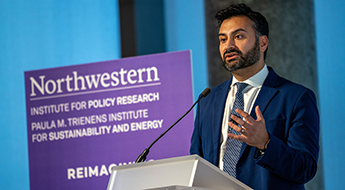Linda Teplin Elected AAAS Fellow
IPR associate honored for distinguished contributions to public health policy
Get all our news
We found that police arrested many people with mental disorders because the mental health system had failed to provide services and housing in the community. Essentially, the jail had become the poor person’s mental hospital. So I began to study people in jails, prisons, and detention centers.”
Linda Teplin
Behavioral scientist and IPR associate

Behavioral scientist and IPR associate Linda Teplin was elected a 2022 fellow of the American Association for the Advancement of Science (AAAS) in recognition of her “distinguished contributions to public health policy, particularly landmark longitudinal studies that guide the redress of racial and ethnic disparities in incarceration and its consequences for mental and physical health.”
Teplin, the Owen L. Coon Professor of Psychiatry and Behavioral Sciences, is a long-time IPR associate. Her research over four decades has centered on the health of incarcerated populations, which she began in her first research study at Northwestern’s medical school. She studied how police managed in their new role as “street corner psychiatrists,” which was forced upon them by deinstitutionalization.
“I never intended to study incarcerated populations,” Teplin recalled. “But we found that police arrested many people with mental disorders because the mental health system had failed to provide services and housing in the community. Essentially, the jail had become the poor person’s mental hospital. So I began to study people in jails, prisons, and detention centers."
She is the principal investigator of the Northwestern Juvenile Project, the first large-scale longitudinal study of health needs and outcomes of juvenile detainees. In this study, her team tracks and re-interviews over 1,800 youth who were initially arrested and detained between 1995 and 1998, looking at psychiatric disorders, substance abuse, health services, HIV/AIDS risk behaviors, and more. She also conducts The Next Generation study, an extension of the original Northwestern Juvenile Project, which examines the original participants and their children. Next Generation is the first prospective intergenerational study of a correctional population.
The AAAS, founded in 1848, is the world’s largest multidisciplinary scientific society and the publisher of the Science family of journals. Teplin is one of 505 newly elected fellows across many fields and joins several IPR faculty elected to the prestigious scholarly academy.
She credits IPR with broadening her interdisciplinary focus as she continued her research path.
“I joke that I have no discipline,” Teplin said. “I am comfortable with both qualitative and quantitative methods, and incorporate concepts and methodological approaches from psychology, psychiatry, sociology, epidemiology, and public health—you name it—to improve the health of incarcerated populations. In IPR tradition, our work guides public policy—it’s cited in amicus briefs to the Supreme Court and in reports to the Surgeon General.”
Linda Teplin is the Owen L. Coon Professor of Psychiatry and Behavioral Sciences, professor of medicine (infectious diseases), vice chair for research in psychiatry and behavioral sciences, and an IPR associate.
Published: March 29, 2023.


